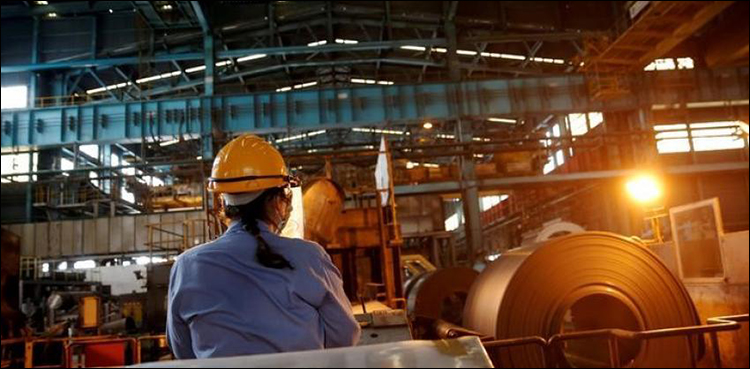
BEIJING: China’s factory activity contracted for the first time in over two years in December, highlighting the challenges facing Beijing as it seeks to end a bruising trade war with Washington and reduce the risk of a sharper economic slowdown in 2019.
The increasing strain on factories signals a continued loss of momentum in China, adding to worries about softening global growth, especially if the Sino-U.S. dispute drags on.
Trade frictions are already disrupting global supply chains, fuelling concerns of a bigger blow next year to world trade, investment and shaky financial markets.
The official Purchasing Managers’ Index (PMI) – the first snapshot of China’s economy each month – fell to 49.4 in December, below the 50-point level that separates growth from contraction, a National Bureau of Statistics (NBS) survey showed on Monday.
It was the first contraction since July 2016 and the weakest reading since February 2016. Analysts had forecast it would dip to 49.9 from 50.0 the previous month.
China is expected to roll out more economic support measures in coming months on top of a raft of initiatives this year. A prolonged downturn in the factory sector, key for jobs, would likely spark further attempts to juice domestic demand.
In November, industrial output rose the least in nearly three years, while earnings growth at industrial firms fell for the first time in nearly three years.
A PMI sub-index on overall factory output prices fell to 43.3 in December from 46.4, signalling earnings erosion. A gauge on overall production fell to 50.8, the lowest since February, from 51.9.
New orders – an indicator of future activity – continued to soften, reinforcing views that business conditions in China will likely get worse before they get better.
A sub-index for total new orders contracted for the first time in at least a year, falling to 49.7 amid persistently weak demand at home and softening global growth.
New export orders shrank for a seventh straight month, with the sub-index falling to 46.6 from 47.0.
TRADE WAR UNCERTAINTIES
Many analysts doubt that Beijing and Washington can bridge their many differences and reach a comprehensive trade deal in the latest round of talks.
U.S. President Donald Trump and Chinese President Xi Jinping agreed early this month to a 90-day ceasefire that delayed a planned Jan. 1 U.S. increase of tariffs on $200 billion worth of Chinese goods while the two sides negotiate.
Trump said over the weekend that a possible trade deal was progressing well, but few concrete details have emerged.
The trade war has resulted in billions of dollars of losses for both sides this year, hitting industries from autos and technology to U.S. agriculture.
“There are many short-term orders from overseas but few long-term orders received by Chinese factories as caution remains amid the trade uncertainties,” said Nie Wen, economist at Hwabao Trust in Shanghai.
“The medium to long-term export prospect is not optimistic particularly.”
Warehouses across the U.S. are bursting with Chinese goods after retailers stocked up before fresh tariffs, suggesting little chance of a near-term export rebound even if a trade deal is reached.
CONSUMER CAUTION
One bright spot in the downbeat data was a modest pick-up in the services sector. The official non-manufacturing PMI rose to 53.8 from 53.4.
While that offers some cushion – services account for over half of the economy – consumers remain cautious.
China’s auto sector has been particularly hard hit. Sales in the world’s biggest auto market are on track to fall for the first time since at least 1990.
“Last December we saw overall China carmakers’ capacity utilisation rate at around 56 percent, but now we estimate it is roughly 50 percent,” Shanghai-based senior analyst Alan Kang at LMC Automotive told Reuters. “Carmakers in general are cutting production.”
China’s stock market tumbled about 25 percent in 2018, while the yuan has lost around 5 percent versus the dollar.
There are also signs China’s booming e-commerce may have started to moderate, with the country’s express delivery sector seeing slightly slower revenue growth towards year-end.
The courier sector raked in 542.88 billion yuan ($79 billion) in revenue from January-November, up 22.3 percent from a year earlier, the official Xinhua news agency reported on Monday, citing the State Post Bureau (SPB).
That was slower than 23.5 percent growth in the first 10 months, and less than the 24.7 percent clip for all of 2017.
Beijing says China is still on track to hit its growth target of around 6.5 percent, down from 6.9 percent in 2017, but the economy is expected to lose a few more steps next year.
The World Bank predicts growth will slow to 6.2 percent in 2019, still robust by global standards but the weakest expansion in nearly 30 years.
The post China factory activity shrinks for first time in over two years appeared first on ARYNEWS.
from ARYNEWS http://bit.ly/2AmajaC
Comments
Post a Comment